If you’re looking for the best online course software, then you might be facing some overwhelm with all the choices that exist online.
There’s much to consider, from the cost of the software, features and services included, ease of use, and other factors. These 8 online course software programs offer everything you need to build and run your online course.
What to Look for in Online Course Software
One of the factors that will contribute to your success is the online course software you use to build, design, and promote your course.
Every platform has their unique offerings but, you should pick a platform that has all the features and services most important to you:
- Customization options: Flexibility in designing your online school, sales page, and/or course homepage and curriculum.
- Ease of use: Software that’s easy to use with little to no training required for operation.
- Support options: Flexible support options so you know where to turn if you have questions. This can include support hours by phone, email or chat, an online community, knowledgebase, or other support.
- Flexible pricing: The ability to price your course the way you want to, whether it’s subscription-based, one-time pricing, etc.
- Cost: An affordably-priced platform for your business.
Online Course Software Platforms vs Online Course Marketplaces
In this roundup, we’re looking at eight online course platforms, six of which are software programs and two which are course marketplaces.
What’s the difference?
The main advantage of course software is the flexibility with customization, pricing, and nearly every other feature. You can sell subscription courses, offer one-time billing, give coupon codes, certificates, give students access to course-centered communities, and more.
The drawback is, the marketing strategy depends on you. You could have a great course but with poor marketing you’ll have few sales.
Alternatively, course marketplaces are like a shopping mall. Marketplaces pour a lot of resources into building their traffic. Once that traffic is there, they can find you, and buy on the spot.
It might mean less work for you in terms of marketing but, not without some restrictions which you might not be in favor of, compared to all the flexibility you get with course software.
First, you’ll find that many marketplaces won’t have the same customization options as course software platforms. There may be some room for you to add your design elements here and there but, on a much smaller scale than the alternative.
Next, you may find limitations on pricing, automatic opt-ins to sales or promotions the marketplace is running, and other restrictions.
The benefit of marketplaces is automatic acceptance into their course catalog where you’ll have access to their traffic to sell your course.
The downside is adhering to all their rules and limitations.
1. Teachable
Teachable is one of the best online course platforms to build your online education business.
After you sign up, you’ll get all the tools you need to build your online school, courses, and coaching right on their platform.
You’ll enjoy the flexibility with designing and building your courses. No coding skills are required with Teachable but if you happen to know some coding or decide to bring on a web developer, you can use their Power Editor to customize your school as you wish.
Teachable Pricing

Three plans are available at monthly and annual pricing (discounts available for annual pricing).
Basic ($39/month): With Basic here’s a look at some of the main features included with your plan:
- 5% transaction fees
- Ability to create courses, coaching programs, and subscription courses
- 2 admin-level users
- Access to TeachableU
- 2 admins
Pro ($119/month): The Pro plan includes everything in Basic along with:
- Zero transaction fees
- Priority support
- Certificates
- Advanced reporting
- No Teachable branding
- 5 admins
Business ($299/month): The Business plan includes everything in Pro plus:
- Group coaching calls
- Advanced theme customization
- 20 admins
TeachableU
TeachableU is online course training provided by Teachable. You’ll get access to training to help you build, launch and market your course. You’ll learn about how to build your audience, how to choose your course topic, and more.
There are also partner workshops which are live-streamed online on a variety of helpful topics, given over Zoom.
Once you’re logged into your Teachable dashboard, you can access TeachableU in your left navigation bar.
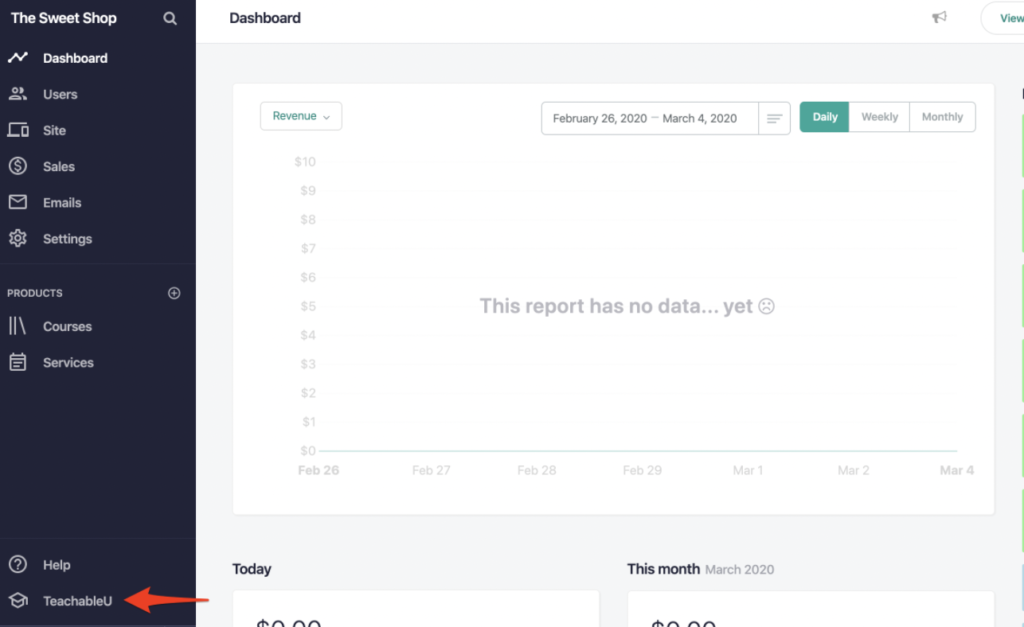
Here’s our full Teachable review.
2. Thinkific
Thinkific is an all-in-one platform that can help you create, design, promote and launch your online course.
You’ll have access to many services and features that you can use to build your course like multiple instructors, hidden courses, membership sites, quizzes, etc.
The course templates are a big time saver. Templates help you organize your ideas within your course in a professional-looking, attractive template.
As a Thinkific creator, you’ll get access to these templates:
- Blank canvas: A blank canvas where you can let your imagination take over and design your course just as you’d like.
- Mini course: The best fit for low-cost or free courses with less content.
- Flagship course: The template for the main course you’re known for.
- Pre-sell: Designed to help you pre-sell your upcoming course quickly.
- Membership resource library: For a library of tools or resources that you offer your audience.
- Webinar replay: Best for hosting webinar replays.
Thinkific pricing
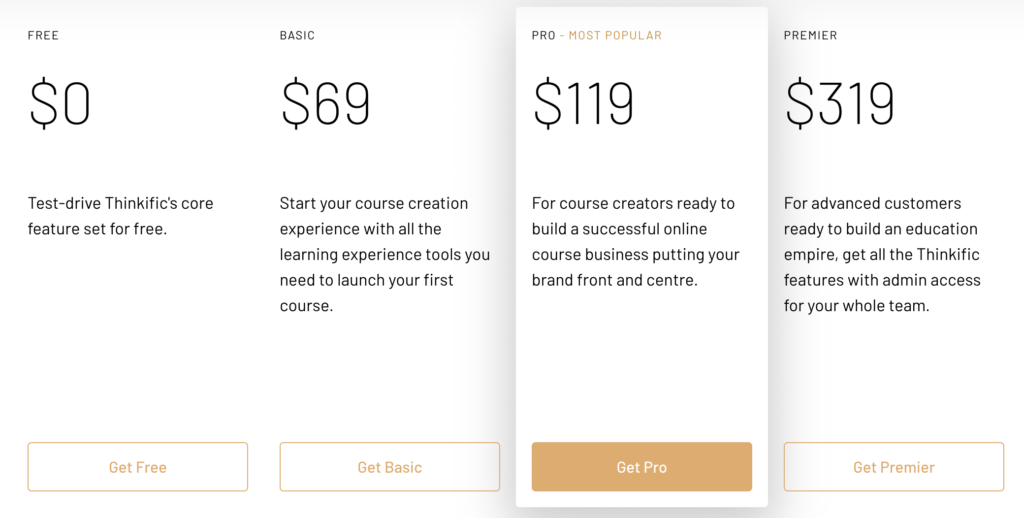
All Thinkific plans come with core features, some of which include:
- Drag-and-drop course builder
- SSL certificate
- Upsells
- Discussion forums
- Secure cloud hosting
Four pricing plans are available including a free plan. You can pay monthly or annually. Here’s a look at each plan along with the best features included:
Free ($0):
- Limited number of courses available to create
- Quizzes and surveys
- Content hosting
Basic ($79/mo): You get everything in the Free plan along with:
- Up to courses
- Thinkific App Store
- Custom domain
- Coupons
- Drip content
Pro ($149/mo): The most popular plan with Thinkific gets you:
- Up to 25 courses
- Up to 2 site admins
- Up to 5 course admins
- No Thinkific branding
- Custom code editor
Premier ($399/mo): You get everything in Pro, along with:
- Up to 100 courses
- Up to 5 site admins
- Up to 15 group analysts
- Up to 50 group admins
- API access
If you’re a large company with more needs, Thinkific Plus is available. For more on this plan including features and pricing, contact Thinkific.
Here’s our full Thinkific Review.
3. Podia
Podia is great for courses, digital products, selling memberships, and webinars. It’s a hub or digital storefront for all your online products.
With courses you’ll be able to host unlimited files and unlimited videos. You’ll also get access to quizzes, drip content, and upsells.
You can also sell digital downloads, such as PDFs and ebooks. You get access to coupons, upsells, bundles, instant payouts and there are zero transaction fees!
Memberships are subscription-based and a great way to make recurring revenue. They include unlimited members and different membership levels.
You can also provide free or paid webinars.
Podia pricing
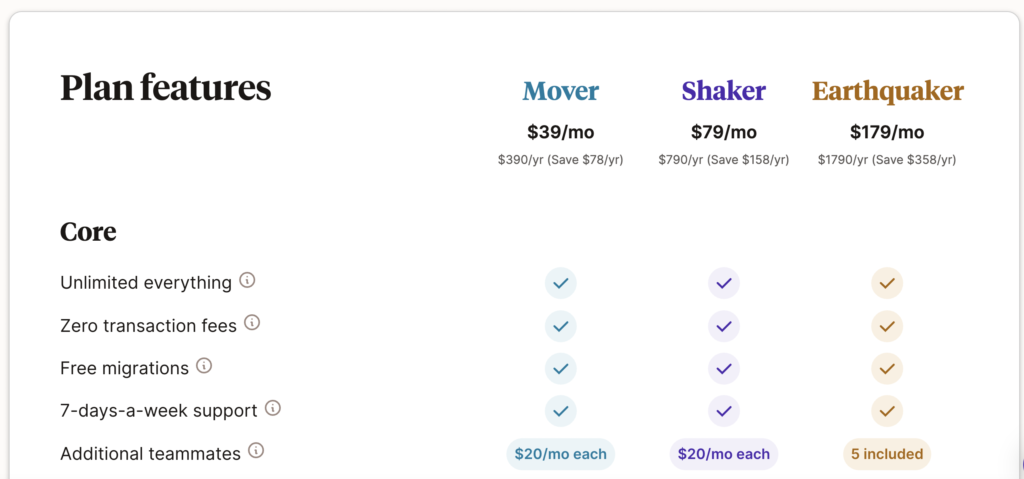
Podia has three pricing plans, paid monthly or annually (discounts for annual billing plus free migration from another platform). There’s also a 14-day free trial.
All plans include these core features:
- Unlimited everything
- Zero transaction fees
- Free migration
- Free support 7/days per week
- Additional teammates at $20/month upgrade (except Earthquaker plan which includes 5 extra teammates)
Mover ($39/month)
The Mover plan is for selling courses, digital downloads, and webinars. Here are some of the features included:
- Custom website
- Unlimited email subscribers
- Up to 5,000 monthly email recipients
Shaker ($79/month)
The Shaker plan gets you access to sell all products: courses, digital downloads, memberships, and webinars. You get:
- All the marketing features of the Mover plan plus,
- Affiliate marketing and embeds
- Unlimited email subscribers
- Up to 15,000 monthly email recipients
Earthquaker ($179/month)
Earthquaker is the top tier plan with Podia which included:
- Everything in Shaker plus,
- Unlimited email subscribers
- Up to 50,000 monthly email recipients
- Dedicated account manager
- Personalized onboarding call
- Monthly group creator call
- White labeled website
4. Learndash
Get started with Learndash is a WordPress plugin that you’ll use to build and host your courses directly on your WordPress site. This is unlike the other platform-based course software tools shared since Learndash is a plugin for WordPress.
Learnash offers a flexible solution for your course hosting. They can accommodate any pricing model, any payment gateway, and they help you get up and running with their Learndash Bootcamp.
Learndash pricing
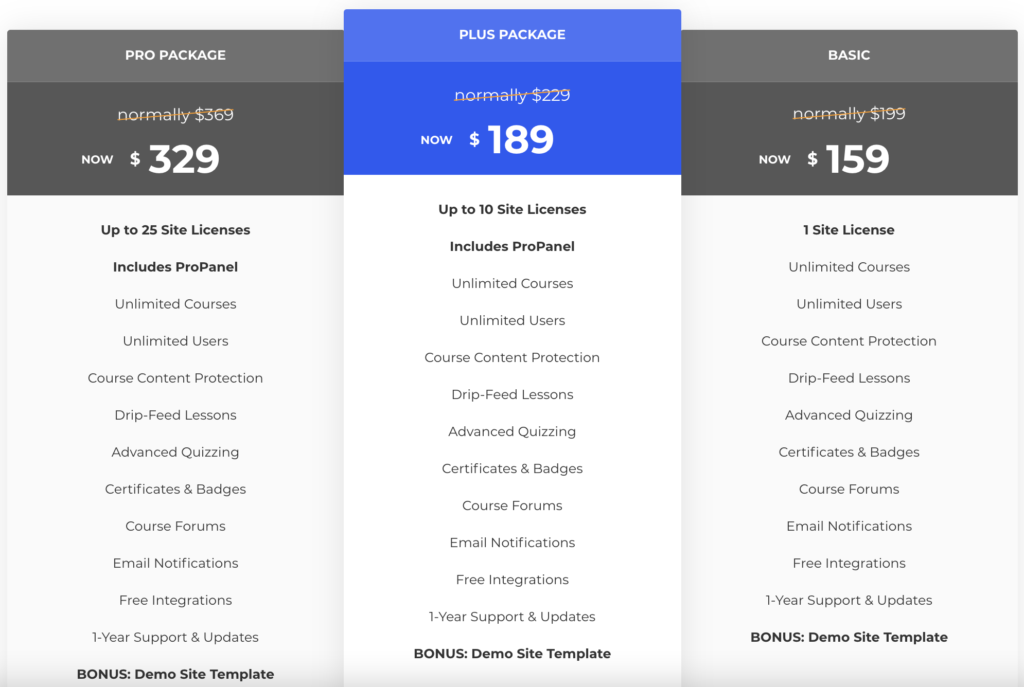
There are three billing plans available on annual pricing. It comes with a 30-day money-back guarantee.
Basic ($159/year):
- 1 site license
- Unlimited courses and unlimited users
- Drip fed lessons
- Course forums
- 1-year support and updates
Plus Package ($189/year):
- Up to 10 site licenses
- ProPanel access
- Course forums
- Certificates and badges
- 1-year support and updates
Pro Package ($329/year):
- Everything in the Plus package plus,
- Up to 25 site licenses
- ProPanel access
- 1-year of support and updates.
Here’s our full Learndash review.
5. Learnworlds
Similar to Teachable, Learnworlds can help you build your education business by providing you with your own online school or website.
Templates and layouts are available to help you quickly set up your school. Features include marketing tools like coupons, promotions, and memberships. Third-party integrations, an affiliate program, payment gateways, and advanced reporting and insights are also available.
Courses come with their own social network. Students are encouraged to engage with one another and they’ll have the opportunity to network and connect, learning in a community-based environment.
It’s like online courses meet Facebook groups.
Learnworlds pricing
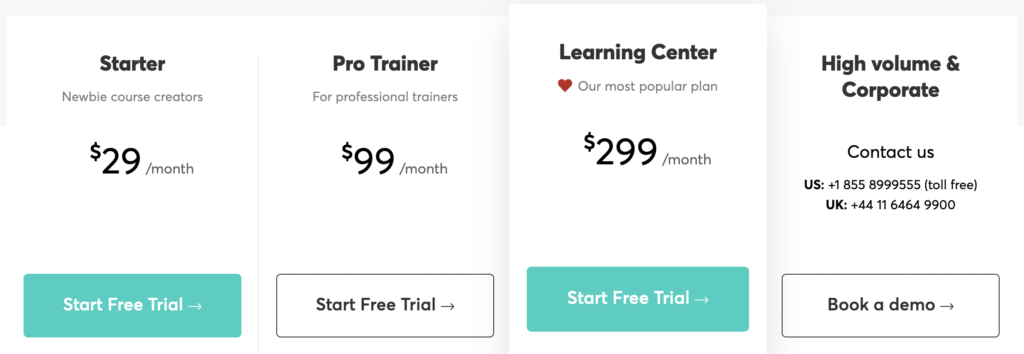
Monthly and annual plans billing plans are available with a discount for annual billing. A free 30-day trial is also available with all plans except the high volume plan.
Here are some of the best core features included in every plan:
- Unlimited courses
- Video library
- Theme editor
- Branding
- Coupons and upsells
Starter ($29/month): For entry level creators you get 1 admin and a 3-page site builder plus custom domain on this plan. Here’s a look at the best features included in the Starter plan:
- $5 fee per course sale
- Free courses
- Unlimited paid courses
- Pop-up builder (with 2 pop-ups)
- Basic integrations ( to tools like Google Analytics, Mailchimp, FOMO, and others)
- Free SSL certificate
Pro ($99/month): Everything in the Starter plan is included on Pro. You get 5 admins, unlimited free and paid courses and unlimited landing pages. Here are some of the best features also includeD:
- Zero transaction fees
- Complete website builder
- Unlimited Pop-ups
- Subscriptions and memberships
- Live classes and webinars
- Affiliate management
- Zapier and premium integrations ( to tools like HubSpot, Referral Candy, and others)
- 24/7 Priority Email support
Learning Center ($299/mo): Everything in Pro is included on the Learning Center plan. You get 20 admins plus access to bulk user actions, white-label options, Webhooks integrations and more. Some of the features included in this plan:
- No transaction fees
- Auto transcripts and subtitles
- Zoom and Webex multiple accounts
- Scheduled automated reports
- API integrations
- SSO (single sign-on)
- 24/7 Priority Email support
High volume and corporate: The high volume plan is for high volume sellers. Pricing isn’t shown on the site but you can contact Learnworlds to learn more, find out about pricing and book a demo. You get everything in the Learning Center plan along with these best features:
- No Transaction Fees
- Additional Admins
- 99.95% Server Uptime
- Premium Cloud Servers
- Flexible Invoicing
- Custom Reports & Services
- Premium Support Options
6. Kajabi
Kajabi is a total all-in-one solution to handle your entire education business. You’ll be able to build and create courses, grow your email list, set marketing campaigns, and a lot more.
While Kajabi can cater to creators at all levels, it’s really the best fit for more experienced creators with large courses or multiple seasoned courses.
Kajabi offers a lot of tools to their creators and they all work together nicely:
- Subscriptions
- Digital courses
- Digital products
- Landing page builders
- Course hosting
- Shopping carts
- Facebook groups
This is just a glimpse into some of Kajabi’s best features which will be included with your plan.
Your Kajabi products are flexible and completely customizable. The design template fits every style and you’ll have the ability to add further design and add branding to your course library, blog pages, and other places.
Opt-in forms, videos, pricing blocks, FAQ blocks, and other features can be added to your course.
You can also connect your existing domain or use Kajabi’s extension, your choice.
Kajabi pricing

You get your choice of three pricing plans which you can pay monthly or annually (20% discount for annual). There’s also a 14-day free trial that you can join under any of the plans.
The core features included in all plans are:
- 0% transaction fees (Stripe or PayPal fees may apply)
- Kajabi University access
- Webinars and events
- Templates
- Assessments
- Automations
- Onboarding call
Basic ($149/month): This is for one website with one admin user.
- 3 products
- 3 pipelines
- Unlimited landing pages
- Unlimited marketing emails
- 10,000 contacts and 1,000 active members
Growth ($199/month): The Growth plan is for one website with 10 admins.
- 15 products
- 15 pipelines
- Unlimited landing pages and unlimited marketing emails
- 25,000 contacts and 10,000 active members
- 24/7 chat support
- Advanced automations
- No Kajabi branding
- Affiliate program
Pro ($399/month): Pro gets you 3 websites with 25 admins.
- 100 products
- 100 pipelines
- Unlimited landing pages and unlimited marketing emails
- 100,000 contacts and 20,000 active members
- 24/7 chat support
- Advanced automations
- No Kajabi branding
- Affiliate program
- Code editor
Here is our full Kajabi review.
7. Udemy
Udemy is the first of two course marketplaces we’ll talk about in this roundup. This is not online course software but it might be a good alternative or a nice complement to selling through software.
In a marketplace, you’ll get access to the marketplace’s traffic. It’s like comparing selling on Amazon as an Amazon seller to selling privately in your own Shopify store.
Selling privately lets you design your store exactly the way you want, set your pricing as you wish, and create a customer experience you want for your brand. But, you have to work much harder to get traffic and exposure, compared to running your brand on Amazon as an Amazon seller.
Udemy offer a lot of support options to help you launch your course on Udemy from their instructor support team and teaching center, to their online community.
Udemy is a good solution for launching your first course on a marketplace.They give you tips and best practices throughout the course creation process to help you go through each section from filming to editing and your curriculum layout.
Take advantage of the free teaching center that helps you with your questions about content, recording, scripting, etc.
Udemy pricing
There’s no fee to join Udemy as an instructor and you can create an unlimited number of free and paid courses. They take a revenue share from the courses you sell and the percentage they take varies based on how the student reaches your course.
If the student finds you on the marketplace Udemy takes a 37% revenue share. However if they have an instructor coupon, which means you sent them to the course through your own marketing efforts, Udemy takes a 3% revenue share.
Processing fees are not included in this calculation.
8. Skillshare
Skillshare operates a little differently than Udemy. From a student’s perspective, with Udemy you land on the site as a buyer and you can buy as many individual courses as you’d like. Some courses might be $10, others might be $100. You pick the courses you’re interested in and buy.
Skillshare offers students an annual or monthly membership.
In exchange for paying Skillshare on a recurring basis, students get access to all their courses on the platform.
Skillshare pays it’s instructors based on the number of minutes consumed from your courses.
You also get $10 per referral to Skillshare. So if you are actively promoting your course you’d get an extra $10 for each new person you introduce to Skillshare on top of any instructor fees you get when students watch your lessons.
Classes include video lessons plus a class project. Classes are pre-recorded and they average about 30-40 minutes in length.
The class assignment is a neat engagement tool that is offered at the end of the class. The purpose is for students to use the skills they learned in the class to perform a related action to demonstrate their new skillset.
Skillshare pricing
It’s free to join Skillshare as a teacher.
Final Thoughts on Online Course Creation Software
Any of these online course software options could be a fit for your unique situation, whether you’re a beginner, a seasoned course creator, or looking for the easiest, fastest way to sell your courses to everyone.
Whatever your reason for creating courses, there is a platform to help you reach your goals from reaching a global audience to creating an additional online income stream.
Which course creation platform is your favorite?

Leave a Reply